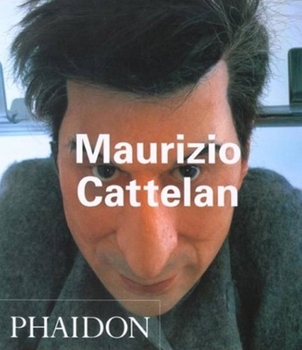Maurizio Cattelan
Maurizio Cattelan (b.1960) is today's best-known Italian artist. In some ways an heir to the legendary Italian 'anti-artist' Piero Manzoni, Cattelan produces witty, unorthodox performances, sculptures and photoworks that are as varied as they are unsettling. This humorous, untraditional art often takes an off-centre standpoint at the margins of mainstream society to poke fun at art history, monumentality and nationalism. Cattelan was once a furniture designer, which infuses all his unconventional work with a surprising elegance that is especially striking. He works in a great variety of media. Examples include a real stuffed horse hung from the magnificent ceiling of a great Italian Palazzo ( Novecento , 1997) in reference to Arte Povera artist Jannis Kounellis' exhibition of 12 real horses in Rome some thirty years before; and a 'homeless person' mannequin, realistically slumped on a city sidewalk, the lifeless reminder of the wasted human lives we witness daily in city streets. References to Arte Povera, classic Italian figurative sculpture and much post-war art and culture are blended in Cattelan's work with the artist's own idiosyncracies. Over the years, Cattelan - working with themes that vary from thievery to escapism to childhood - has consistently produced significant artworks that have captured the attention of the international art world and established him as one of the most exciting artists working today. Italian curator and critic Francesco Bonami describes in his Survey the artist's development in his local political and socio-historical context. In the Interview, critic and Solomon R. Guggenheim Museum curator Nancy Spector draws out the aritist's 'slippery' personality while offering solid interpretations of the work. Belgium-based curator and writer Barbara Vanderlinden offers a firsthand response in the Focus to Cattelan's monumental project first shown at Manifesta 2 (1998), an untitled work consisting of a living tree growing from an exposed block of soil within the exhibition space itself. Cattelan has chosen an extract from Portnoy's Complaint (1969) by Philip Roth and extracts from ...Or Not to Be: A Collection of Suicide Notes (ed. Marc Etkind, 1997), both echoing the artist's often tragi-comical evocations of desperation and escapism. Maurizio Cattelan's statements and previous interviews, collected here, include his occasional appropriation of the words and even identities of others. In the Update section, critic and curator Massimiliano Gioni surveys Cattelan's work from 2000 to the present.
Format:Paperback
Language:English
ISBN:0714843067
ISBN13:9780714843063
Release Date:May 2003
Publisher:Phaidon Press
Length:212 Pages
Weight:0.75 lbs.
Dimensions:0.7" x 5.5" x 6.3"
Age Range:13 years and up
Grade Range:Grade 8 to Postsecondary
Customer Reviews
0 rating





